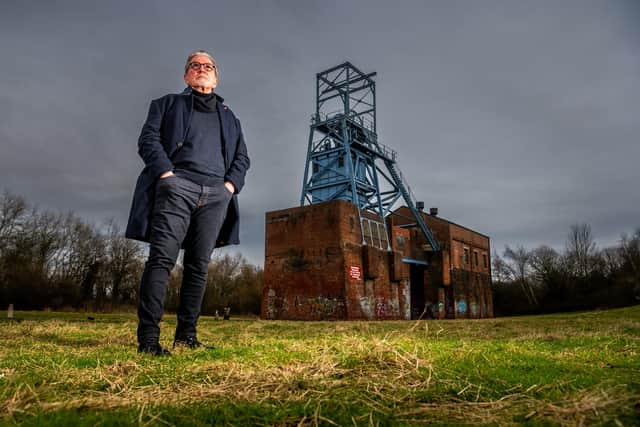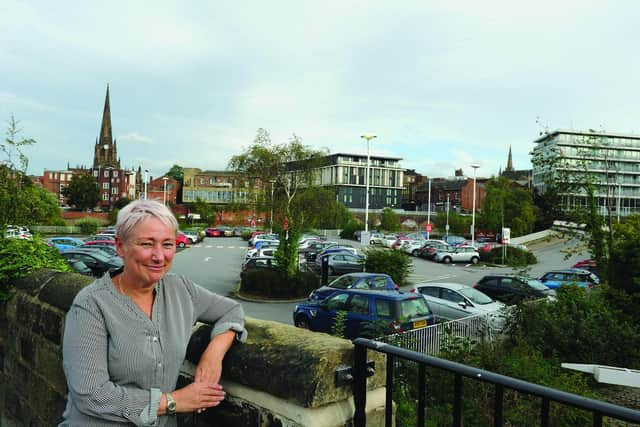Yorkshire memories of the miners' strike, 40 years on, from those who would 'do it all again today'
“Some things are inevitable. The strike was inevitable. Was the outcome inevitable? Probably so. But would I do it again? Yes, without a doubt.”
The sentiments of David Nixon, who worked at Hatfield Main colliery and took 10 years to pay off debts accrued from the strike, are echoed by other former miners from South Yorkshire, where the vast majority stayed out for the whole year.
Advertisement
Hide AdAdvertisement
Hide AdJohnny Wood, who worked at Grimethorpe pit near Barnsley, and like many relied on soup kitchens to help get by, said: “I was proud of what I did. I fought not just for my employment but for employment for the area. I fought for the best interests of the surrounding communities of Barnsley.”


Steve Wyatt, a Dodworth colliery miner, sold off his collection of miners’ lamps at one point to stave off repossession of the family home. Had he ever doubted what he was doing? “No. I’d do it today.”
Viewed through the prism of history, their conviction holds water. Mass pit closures followed in the years after the strike, devastating communities engulfed by unemployment and poverty.
At the time of the dispute, NUM leader Arthur Scargill insisted Margaret Thatcher’s government was planning for a far wider pit closure programme than the publicly announced demise of 20 pits with 20,000 job losses.
Advertisement
Hide AdAdvertisement
Hide Ad“They said Scargill and NUM were scaremongering,” said Mr Wood. “No, we weren’t scaremongering, we were telling the truth.


“We didn’t lose the strike, we educated the nation on the lies that the government told at that time. They said that we were scaremongering and we weren’t. History has actually proven without a shadow of doubt that we told the truth.”
Previous miners’ strikes over pay in 1972 and 1974 had lasted just weeks, with both ending in victory for a powerful NUM that then had the ability to disrupt the nation’s power supply. The second strike effectively brought down Ted Heath’s Conservative government.
Memories of those successes were still relatively fresh in 1984. Mr Wood said: “I was expecting probably a month or two because the union was strong at that time, really strong. We’d got Scargill on board, an intelligent man who led us into a lot of things and spoke a lot of truth… so we were expecting it wouldn’t be all that long.”
Advertisement
Hide AdAdvertisement
Hide AdInstead, the NUM ran into a determined Mrs Thatcher and an organised government that had stockpiled coal in readiness for a strike. Mr Nixon recalled: “Round about August time I always remember going past a stockpile outside a power station and saying that is huge. When I saw that stockpile I thought ‘we’re in big trouble’.”
The government was also prepared to support the use of draconian police powers, including stopping miners, when they could, from travelling to picket. For South Yorkshire miners that was often driving into Nottinghamshire where most miners worked during the strike.
Mr Nixon recalled how relations with police were initially relatively friendly on picket lines - both sides chatting with each other, miners then shouting ‘oh, do the hokey-cokey’ when pushing back and forth with police as working miners arrived before resuming chatting about football, holidays and the like.
“And then suddenly it’s changed. It was like ‘hold on, what’s happening here?’ We were exactly the same but the police were coming up with riot gear and started doing the tactic of going into a crowd of pickets and just picking people off and arresting them and then charging them with disturbing the peace or whatever.
Advertisement
Hide AdAdvertisement
Hide Ad“Of course what we found out later was the government wanted to get the police to be a bit more forceful and that’s what they ended up doing.”
In all, more than 11,000 miners were arrested during the strike and relations between mining communities and the police remained fractured for years afterwards.
From outset, the strike was beset with controversy about the NUM’s decision not to call a national ballot and instead allow local areas to decide. It became a heavy anchor dragging the strike’s momentum, sapping support from other unions, the Labour Party and the wider public, notwithstanding the tide of donations striking miners received throughout.
But Mr Nixon said the notion of voting on the potential future of another miner’s pit and livelihood represented an impossible choice.
Advertisement
Hide AdAdvertisement
Hide Ad“This is not about increasing wages, this is not about terms and conditions, this is about somebody’s job. But it goes beyond that – it’s about a community. It’s not just one person, you’re talking about a pit that could have 2,000 people and for that pit to close down doesn’t cause a ripple effect, it’s a tsunami.
“So, what right have I to say to anyone that I’m going to vote to close your pit?”
Miners in the key, large Nottinghamshire coalfield did hold a ballot with more than 70 per cent voting to continue working. The bitterness towards those considered ‘scabs’ is still there among those who endured hardship for a year.
For Mr Wood, the subsequent closure of pits in Nottinghamshire showed “they were wrong and at the end of the day they haven’t got a job, the same as us.”
Advertisement
Hide AdAdvertisement
Hide Ad“I survived for 12 months, those in Nottinghamshire could have survived for 12 months and we’d have won it they’d have come out,” said Mr Nixon. “But all they could think about was their economic benefit.”
Working with strike-breakers after the return to work was a challenge and Mr Wyatt recalled a notice going up at Dodworth colliery warning calling someone a ‘scab’ would result in instant dismissal.
In response, striking miners used ‘Henry’ as a substitute – after the name of Henry Wakefield, a fictional character who had crossed a picket line in TV’s Coronation Street.
Despite the passage of time, the camaraderie, the hardship, the picket line confrontations and the rest all left a lasting mark, creating a cache of memories still pin-sharp today.
Advertisement
Hide AdAdvertisement
Hide AdAs Mr Nixon put it: “Who remembers a full year of their life? That’s one year I remember from the beginning to the end.”
SHE was not long into her teens but Denise Lelliott already knew what the miners’ strike meant to her family and her community.
Now a senior Rotherham councillor, Denise was just 14 at the time. Her dad and two brothers were miners at Barnburgh pit and the family home in Brampton was just a couple of hundred yards from Cortonwood colliery, where the strike started and where the picket line later became known as ‘the Alamo’ due to confrontations with the police.
“Everything we’d ever done and growing up had believed in was at stake,” she said. “All my friends, all their dads worked at the pit. We lived in a community where it went hand-in-hand together.
Advertisement
Hide AdAdvertisement
Hide Ad“We were all very aware of what was happening and why it was happening.”
Denise described the family as “the lucky ones” as they had income from her mum’s work as a cleaner and her sister, who worked in a fried chicken takeaway, though it paled in comparison to the money that used to come in from three miners.
The proximity of the family’s pit house to the picket line meant it became a temporary refuge for miners fleeing charges from baton-wielding, mounted police. The fact the family had bought their house from the National Coal Board (NCB) also meant they could deny access to the police who otherwise could insist on entry to NCB properties.
“We’d got miners hiding everywhere because, you know, they were terrified and they were absolutely getting battered by the police,” Denise recalled.
Advertisement
Hide AdAdvertisement
Hide AdPolitics ran in the family, with her mother a shop steward and her dad active in the NUM. The strike and eventual defeat went on to have a significant impact on both as well as Denise herself.
“The miners’ strike shaped my life. I wouldn’t be doing what I’m doing now if it wasn’t for that.
“It absolutely broke me. I saw men, proud men, my dad being one of them, that absolutely worked their socks off to keep our mines open… it wasn’t even about keeping the mines open, it was about keeping your communities, having your employment, having your education – we all knew what was going to happen if we didn’t win the strike and we didn’t win it and it absolutely broke grown men.
“It broke my dad, I would say that. It knocked the fight out of him – he used to say what’s the point and that destroyed me because my dad was my hero. My dad would never have said that before the strike or during the strike.”
Advertisement
Hide AdAdvertisement
Hide AdDenise recalled the “absolute devastation” she felt when finding out the miners were going back to work but also the determination of her mother, who had helped set up and run the local women’s action group during the strike, to not take defeat lying down.
“I remember saying to my mates, what was the point of all that? I felt that for maybe five minutes, I got how my dad felt and my brothers.
“What snapped me out of it was my ethics - my mum had set out her stall about being a good citizen and doing the right thing and my mum knew that wasn’t the end, it was the beginning.”
And within months the women’s action group had set up the Cortonwood Comeback Community Centre, which has provided support services to the local community, and which Denise has been involved with, ever since.